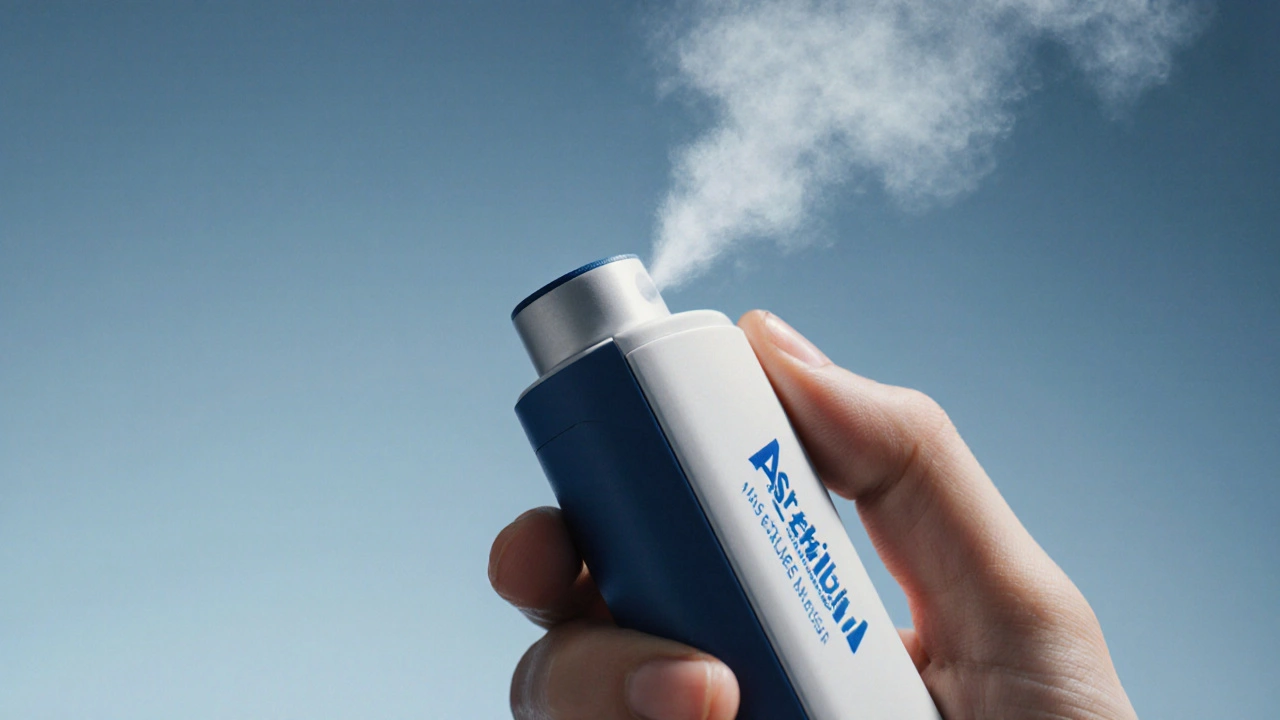Asthalin Inhaler vs Other Salbutamol Alternatives: Detailed Comparison

Inhaler Decision Assistant
Use this tool to find the inhaler that best matches your needs based on your top priorities. Select which criteria matter most to you, and we'll show you the inhalers that best fit your requirements.
Onset Priority
Duration Priority
Side Effect Priority
Cost Priority
Recommended Inhalers
Based on your priorities, these inhalers match your needs best.
Key Takeaways
- Asthalin Inhaler delivers rapid relief but isn’t the only short‑acting bronchodilator on the market.
- Ventolin (Albuterol) and Levalbuterol are the most direct substitutes, sharing similar onset and duration.
- Long‑acting options like Salmeterol and Formoterol are better for maintenance, not rescue.
- Non‑beta‑agonist inhalers such as Ipratropium provide an alternative mechanism and can be combined with Salbutamol.
- Choosing the right inhaler depends on onset speed, duration, side‑effect tolerance, and whether you need rescue or control medication.
What Is Asthalin Inhaler?
When building a picture of quick‑relief inhalers, Asthalin Inhaler is a metered‑dose inhaler (MDI) that contains salbutamol (also known as albuterol in the US), a short‑acting β2‑adrenergic agonist (SABA). First approved in the early 1990s, it’s been a staple in many countries for treating acute asthma symptoms and exercise‑induced bronchoconstriction.
The device releases a fine mist of medication that relaxes airway smooth muscle within minutes, making it a go‑to rescue inhaler for sudden wheeze or shortness of breath.
How Salbutamol Works
Salbutamol binds to β2‑receptors on the bronchial smooth muscle, triggering a cascade that increases intracellular cyclic AMP. The result is rapid muscle relaxation and airway dilation. Because the effect is localized to the lungs, systemic side effects are usually mild, though tremor and palpitations can appear at higher doses.

Common Alternatives to Salbutamol
Several inhalers and oral agents target the same symptom-airway narrowing-but differ in chemistry, onset, and duration. Below are the most frequently considered alternatives.
Ventolin is the brand name for albuterol, the chemical twin of salbutamol, delivered via a similar MDI format.
Levalbuterol (Xopenex) is the R‑enantiomer of albuterol, promising slightly fewer heart‑related side effects while keeping the same bronchodilating power.
Salmeterol (Serevent) belongs to the long‑acting β2‑agonist (LABA) class, taking 10-20 minutes to kick in but lasting up to 12hours.
Formoterol (Foradil, Oxis) is a LABA that combines a rapid onset (similar to SABAs) with a 12‑hour duration, often paired with inhaled steroids.
Theophylline (oral bronchodilator, often in tablet form) works by inhibiting phosphodiesterase, raising cAMP levels indirectly. It provides modest relief over several hours but requires blood‑level monitoring.
Ipratropium bromide (a short‑acting anticholinergic inhaler, known as Atrovent) blocks muscarinic receptors, offering an alternative pathway to bronchodilation.
Budesonide/Formoterol combo (symbicort, a combined inhaled corticosteroid and LABA) is designed for maintenance therapy but can be used as a reliever in some guidelines.
How to Compare Inhalers: Key Criteria
- Onset of action: Seconds to minutes for rescue, hours for maintenance.
- Duration of effect: Short‑acting (4‑6h) vs long‑acting (12h or more).
- Delivery device: MDI, dry‑powder inhaler (DPI), or nebulizer.
- Dosing flexibility: Can you adjust puff count per episode?
- Side‑effect profile: Tremor, tachycardia, dry mouth, etc.
- Regulatory status & availability: Prescription vs over‑the‑counter in your region.
Side‑by‑Side Comparison
| Inhaler / Drug | Class | Onset | Duration | Typical Dose (puffs) | Key Advantage | Common Side Effects |
|---|---|---|---|---|---|---|
| Asthalin (Salbutamol) | SABA | 1-2min | 4-6h | 1-2 puffs as needed | Rapid relief, inexpensive | Tremor, palpitations |
| Ventolin (Albuterol) | SABA | 1-3min | 4-6h | 1-2 puffs | Widely available, similar potency | Tremor, nervousness |
| Levalbuterol | SABA | 2-4min | 4-6h | 1-2 puffs | Lower cardiac stimulation | Mild throat irritation |
| Salmeterol | LABA | 10-20min | ≈12h | 1 puff bid | Long‑lasting control | Headache, muscle cramps |
| Formoterol | LABA | 1-3min | ≈12h | 1 puff bid (often combo) | Fast onset + long duration | Throat irritation, tachycardia |
| Theophylline (oral) | Bronchodilator | 30-60min | 6-12h | 200‑300mg daily | Useful when inhalers not tolerated | Nausea, arrhythmia at high levels |
| Ipratropium bromide | Anticholinergic | 5-15min | 4-6h | 2 puffs q4‑6h | Works via a different pathway, good adjunct | Dry mouth, cough |
| Budesonide/Formoterol combo | ICS+LABA | 1-3min (formoterol part) | ≈12h | 2 puffs bid (or as reliever) | Combines anti‑inflammatory with quick relief | Oral thrush, hoarse voice |

Which Inhaler Fits Your Needs?
Rescue Situations - If you need something that works within a minute, Asthalin, Ventolin, Levalbuterol, or Formoterol (when used as a reliever) are the strongest candidates. Choose Formoterol only if you’re already on a fixed‑dose combo that permits its use as a reliever.
Maintenance Therapy - Salmeterol, Formoterol (always paired with a steroid), or Budesonide/Formoterol combos provide steady coverage. They shouldn’t replace a SABA for sudden attacks.
Cardiac Sensitivity - Levalbuterol or an anticholinergic like Ipratropium may be preferable for patients who experience palpitations with traditional SABAs.
Cost & Accessibility - Asthalin and generic albuterol MDIs are usually the cheapest options. In some markets, Ventolin may be covered by insurance while Asthalin is not, so check local formularies.
Practical Tips for Safe Use
- Shake the MDI for at least 5 seconds before each use.
- Exhale fully, place the mouthpiece, and inhale slowly while pressing down once.
- Hold your breath for about 10 seconds to allow the medication to settle.
- Rinse your mouth after using inhaled steroids to prevent thrush.
- Keep a written action plan: note when you’ve used a rescue inhaler more than twice in 24hours - it may signal worsening asthma.
Always store inhalers at room temperature, away from direct heat. Replace the canister before the expiration date; a missed dose can be life‑threatening.
Frequently Asked Questions
Can I switch from Asthalin to Ventolin without a prescription?
Both contain the same active ingredient (salbutamol/albuterol). In many countries they’re sold over‑the‑counter, so you can buy Ventolin if Asthalin isn’t available, but always check local regulations.
Is Levalbuterol really safer for the heart?
Clinical studies show it causes less tachycardia and tremor at equivalent doses, but it’s still a β2‑agonist, so people with severe cardiac disease should use any SABA cautiously.
Why do some doctors prescribe a LABA for rescue?
Formoterol’s rapid onset (1‑2min) mimics a SABA, and its longer duration can reduce the total number of puffs needed. Guidelines allow it as a reliever only when combined with an inhaled steroid.
Can I use both a SABA and Ipratropium together?
Yes. The combination offers two mechanisms - β2‑agonist and anticholinergic - and is often used in severe asthma or COPD exacerbations.
What should I do if my rescue inhaler isn’t working?
Stop using it, call emergency services, and follow your asthma action plan. A malfunctioning MDI could be empty or clogged.
Next Steps
Take a look at the comparison table and note which criteria matter most for you - speed, duration, side‑effects, or cost. Talk to your healthcare provider about any gaps you spot. If you’re already on a maintenance inhaler, ask whether a SABA‑LABA combo like Formoterol could simplify your regimen.
Finally, keep a spare inhaler in your bag, car, and at work. The right rescue inhaler, whether it’s Asthalin or an alternative, can mean the difference between a brief wheeze and a serious flare‑up.
Paul Griffin
October 13, 2025 AT 20:18When selecting an inhaler, consider the clinical goals first: rapid bronchodilation for acute episodes, and long‑acting coverage for maintenance. The Asthalin inhaler excels in onset speed, delivering relief within one to two minutes, which makes it a reliable rescue option. Cost efficiency also plays a role; generic salbutamol products are typically cheaper than brand‑name alternatives. I recommend discussing with your provider how many puffs you usually need during an attack, then match that to the device’s dose counter. Remember to keep a spare inhaler accessible in your bag, car, and workplace to avoid unexpected gaps in therapy.
Michael Tekely
October 13, 2025 AT 20:25Yo, the pharmacokinetic profile of a SABA like Salbutamol is all about that rapid β₂‑receptor engagement. You want a device that hits the alveolar space in under 60 seconds – that’s why the MDI format of Asthalin or Ventolin is gold. If you’re juggling dose‑adjustable regimens, watch the propellant consistency; any deviation can skew the delivered microgram per puff. Also, keep an eye on the device’s particle size distribution – sub‑micron aerosols transit deeper, improving bronchodilation efficacy. Stay on top of your inhaler technique, it’s the hidden variable that makes or breaks your rescue strategy.
Oscar Taveras
October 13, 2025 AT 20:31It is reassuring to see a thorough comparison that highlights both the strengths and the limitations of each option. Asthalin offers rapid relief, while alternatives such as Formoterol provide a hybrid of speed and duration for those on a combined regimen. By aligning the choice with personal health priorities, patients can achieve better asthma control and confidence in their treatment plan.
katie clark
October 13, 2025 AT 20:38One must acknowledge the subtle nuances that differentiate a mere aerosol from a sophisticated therapeutic instrument. Asthalin, though ubiquitous, lacks the avant‑garde formulation features found in certain proprietary LABA‑ICS combinations, which integrate pharmacodynamic synergy with unparalleled precision. Nevertheless, in the realm of cost‑conscious stewardship, its ubiquity renders it indispensable.
Dervla Rooney
October 13, 2025 AT 20:45The table you provided is exceptionally clear, especially the way it aligns onset and duration with side‑effect profiles. It is important for patients to note that while both Asthalin and Ventolin deliver comparable bronchodilation, individual tolerance to tremor or palpitations may differ. Ensuring proper inhalation technique will maximize drug deposition and minimize systemic exposure.
Johnny Ha
October 13, 2025 AT 20:51Don’t let the pharma giants tell you this is the only way – they want you locked into expensive brand names while cheap generics like Asthalin get pushed aside. The truth is out there: a simple MDI can do the job, no need for fancy patents that inflate prices. Keep your eyes open, question the authority, and demand affordable options.
Lisa Emilie Ness
October 13, 2025 AT 20:58Great overview the side‑effect indicators are helpful and the dosage tips are clear
Emily Wagner
October 13, 2025 AT 21:05In the grand tapestry of respiratory therapeutics, the SABA class serves as the swift knight of relief, cutting through bronchial constriction with a flourish of β₂‑agonism. Yet, the narrative does not end there; when we examine the pharmacological lexicon, we encounter the subtle art of dosage titration, the dance of inhaler technique, and the sociocultural impact of accessibility. Simplicity is key, but depth offers wisdom.
Mark French
October 13, 2025 AT 21:11It ist important to note that proper inhaler technique can streangthen the effectiveness of the drug. Many patients forget to shake the inhaler or hold their breath after inhalation, which can lead to suboptimal outcomes. Please discuss these steps with your healthcare provider to ensure you get the full benefit.
Daylon Knight
October 13, 2025 AT 21:18Oh great, another endless list of inhalers to choose from-because we all love decision fatigue. Seriously, just pick the cheap one and stop overthinking it.
Jason Layne
October 13, 2025 AT 21:25The pharmaceutical agenda hides behind clinical jargon, masking the truth that many of these "alternatives" are merely rebranded versions designed to keep you dependent. Your immune system deserves honest treatment, not a concoction of engineered molecules intended to profit the elite. Resist the manipulation and demand transparency.
Hannah Seo
October 13, 2025 AT 21:31For anyone looking to optimize their inhaler regimen, consider these practical steps: first, verify the device’s expiration date; second, practice the "shake‑inhale‑hold" technique daily; third, maintain a written asthma action plan that outlines when to use a rescue inhaler versus a maintenance option. If you are on a combination inhaler, ensure you understand both the corticosteroid and bronchodilator components. Regular follow‑up appointments allow your clinician to assess control and adjust dosages as needed. Lastly, keep a spare inhaler in a location you frequent to avoid emergency situations.
Victoria Unikel
October 13, 2025 AT 21:38Asthalin works fast.
Lindsey Crowe
October 13, 2025 AT 21:45Wow, another thrilling deep‑dive into inhaler minutiae-how utterly riveting.
Rama Hoetzlein
October 13, 2025 AT 21:51The ontology of bronchodilation reveals a paradox: the more we mechanize relief, the less we acknowledge the body's innate resilience 😊. Nonetheless, the data supports that a well‑chosen SABA like Asthalin can bridge the gap between symptom onset and therapeutic effect, a crucial factor for those whose lives hinge on rapid airway patency.
Lorena Garcia
October 13, 2025 AT 21:58When you weigh the pros and cons, think about how often you need to use a rescue inhaler versus a maintenance one. If you’re prone to sudden attacks, a fast‑acting SABA is essential. For daily control, long‑acting options complement the regimen without overreliance on quick relief.
Dietra Jones
October 13, 2025 AT 22:05Great info but watch out for typos: "inhaler" not "inhalr" and "patient" not "patieint".
AnGeL Zamorano Orozco
October 13, 2025 AT 22:11Listen, let me lay it out step by step so even the most distracted reader can follow. First, the inhaler you pick sets the tone for your entire asthma management strategy; you cannot treat a chronic condition with a haphazard approach. Second, the device’s design-whether MDI or DPI-affects particle size distribution, which in turn influences deposition in the lower airways. Third, smell the propellant; a stale or burnt odor often signals a clogged valve, and using it can waste doses. Fourth, remember that the act of shaking the inhaler isn’t just a ritual; it homogenizes the suspension, ensuring each puff delivers the intended microgram amount. Fifth, the timing between puffs matters; you’ll get a more consistent bronchodilatory response if you wait about 30 seconds between actuations. Sixth, keep track of your canister’s life; many patients ignore the canister counter and end up with an empty device at the worst moment. Seventh, store the inhaler upright at room temperature; extreme heat degrades the medication, while freezing can cause valve malfunction. Eighth, consider the cost-benefit ratio; generic Salbutamol (Asthalin) provides comparable efficacy to brand‑name Ventolin at a fraction of the price, which is critical for patients without insurance coverage. Ninth, educate yourself on side‑effects-tremor, palpitations, and throat irritation are common, but they usually subside with proper technique. Tenth, if you experience persistent side‑effects, discuss alternative SABAs like Levalbuterol with your doctor, as they may offer a smoother cardiac profile. Eleventh, combine your rescue inhaler with a proper maintenance plan; relying solely on SABAs leads to overuse and potential tolerance. Twelfth, keep a rescue inhaler on hand-car, work, gym-because asthma doesn’t schedule appointments. Thirteenth, regularly review your action plan with your healthcare provider to adjust dosage based on control levels. Fourteenth, if you’ve had multiple exacerbations, ask about adjunct therapies such as anticholinergics or oral theophylline. Finally, stay proactive, not reactive; by mastering your inhaler use now, you prevent future crises and maintain a higher quality of life.
Colin Boyd
October 13, 2025 AT 22:18While the previous elaborate exposition is commendable, one might argue that such exhaustive detail can overwhelm the lay reader. Simplicity, not verbosity, often achieves better adherence. Moreover, the insistence on granular procedural steps may obscure the central message: select an appropriate inhaler and use it correctly. Let us therefore prioritize clarity over grandiloquence.